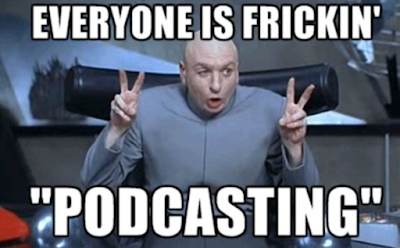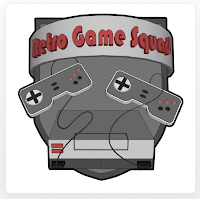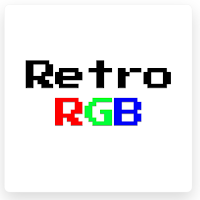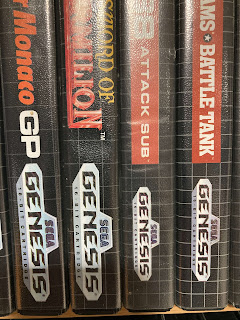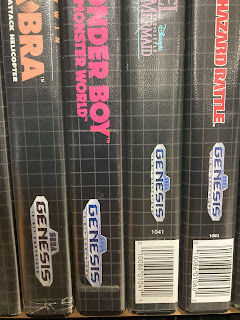There are a lot of retro gaming podcasts out there. I have dabbled in and out of many over the years, and I find myself liking the following podcasts, for different reasons. Some are primarily informational, like review podcasts and collecting podcasts. Some are lighter on the details but more about community and entertainment. Depending on my mood, the amount of time I have, and who else may be listening, there are a lot of options to choose from. These are in no particular order.
 |
Worth It or Worthless
This is a fairly standard retro game review podcast with a slight twist. After thorough discussion a game's merits and demerits, they pit is against its current market value and make the call as to whether they would pay the asking price (worth it) or not (worthless). It's a slant that may date itself as time goes on, due to to astronomical increases in retro game prices, but nonetheless a very thorough and informative review show.
Retro Warriors
When I first saw the original Retro Warriors logo, which consisted of the NES Ikari Warriors cover art, I knew I had to give it a listen. It has been six years, and I am listening still. Justin and Chris cover the wide gamut of retro gaming news, analysis, discussion, and all related talk to those following the retro gaming scene. They have an easy going, discussion format that is easy to listen to and often highly informative. Chris Saturn is the veteran gamer of the pair, and he base of knowledge is deep and accurate. The show format opens with news in the retro gaming scene, followed by the weekly topic at hand. Shows average a little over an hour, and is released weekly. Time flies, and the language is mostly decent with occasional swearing.
Retro Game Squad
Alex, John, and Jeff create a themed list of several games to play and digest, and reconvene to review them together in these long form episodes. Alex is the primary host, John is the resident "genius", and Jeff is up for anything. They are united by a passion of retro games, and it shows. There is a balanced chemistry here, in which each person brings a different background and perspective. Alex is the seasoned veteran gamer, John is down with new and old tech as it pertains to gaming, and Jeff is a wildcard of sorts, with less experience but having the most enthusiasm. Since each episode is themed, and often includes a long list of games to explore over the course of a month or two, they tend to run between 2-3 hours each. The time will fly by as each personality offers different perspectives on each of the games, leaving no stone unturned. The overall tone is polite and cordial, and unoffensive (but not in a lame way).
RetroRGB
Bob Neal's website, www.retrorgb.com, was a strong influence on me to get my gear operating to its full potential. It was here where I learned about RGB video signals, scart connections, console mods, and all of the bits of knowledge on hardware that can be known. A pioneer in the retro gaming scene, Bob's credibility is as good as it gets, and the information is vetted and highly accurate. In recent years a YouTube channel is born from the website, as well as a simul-cast podcast. A plethora of information is provided weekly, on the happenings in retro gaming. Content such as interviews, reviews, news updates, editorials, how-to's, and much more. If you can, watch the videos on YouTube as many topics benefit from the visual aides, but Bob's narration makes the information listenable as well. Language is news-styled and appropriate.
Emulate This
Ryan, Rory, Eric, and Mike are four dudes who somehow manage to make a retro gaming themed podcast. It's a little hard to describe, actually. I think it goes like this. Early on, Rory built Raspberry Pi gaming consoles for the four of them, and they would pick a couple of games, play them, and discuss. As the years progressed, the show has evolved to include some of the strangest non-scripted content ever heard on a podcast. Much alcohol is involved with every episode and you can tell. Stories start leaking out that one cause one to look sideways at them. Themed games are often included, like guess what game this music is from while listening to bathroom noises at full blast, what happened here, and others that are NSFW. Actually, it's all NSFW. They all have very unique personalities, in that you can probably related to one of the four, and you definitely know someone like the other three. My only gripe is that they do mix in a lot of discussion of modern games, which I'm not there for, but to be fair, "retro" is not in their title. Episodes range from 1-2 hours, and are currently released monthly.
The Collectors Quest Podcast
If you think you are a hardcore collector, you don't know anything. These guys have multiple complete collections of the popular consoles, and they have the experience and knowledge to fill books. There are details about games, and then there are DETAILS. These guys know it all. Things like extra contents of complete games besides the manuals, variants of covers and boxes, etc. The passion is clearly evident, and debates about minutia are daily fodder. When I initially started listening to them, I thought they were collecting elitists. As time has passed, I realize that they are so immersed in what they do, that things that may be obvious to them are esoteric to most, there is no intent of being condescending. You may end up feeling that your game collection is small potatoes after listening to these guys, but that passes. Whats more, their rants and diatribes are commonplace and amazing to take in. Language is unfiltered and not safe for little ears. Episodes are on the long side, averaging about 2+ hours, and are released biweekly.
So, those are some of the podcasts that I find myself listening to lately. There are others, but these are the ones that I felt compelled to include.

